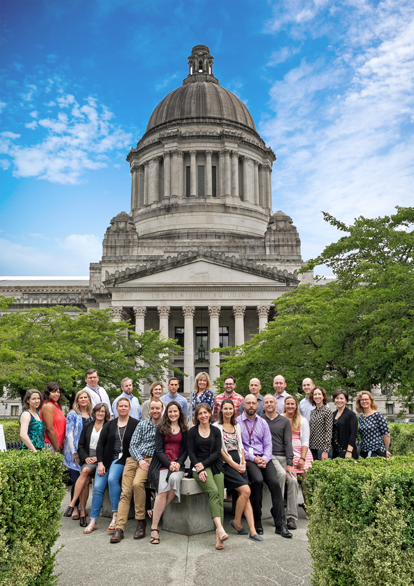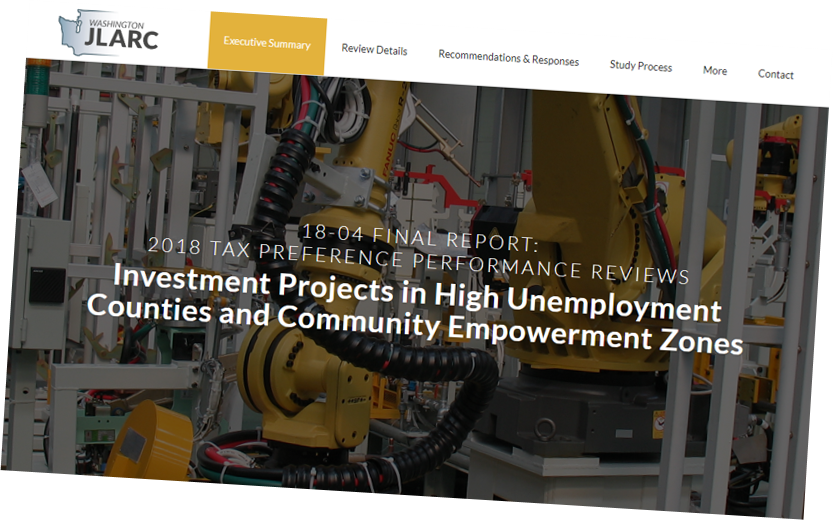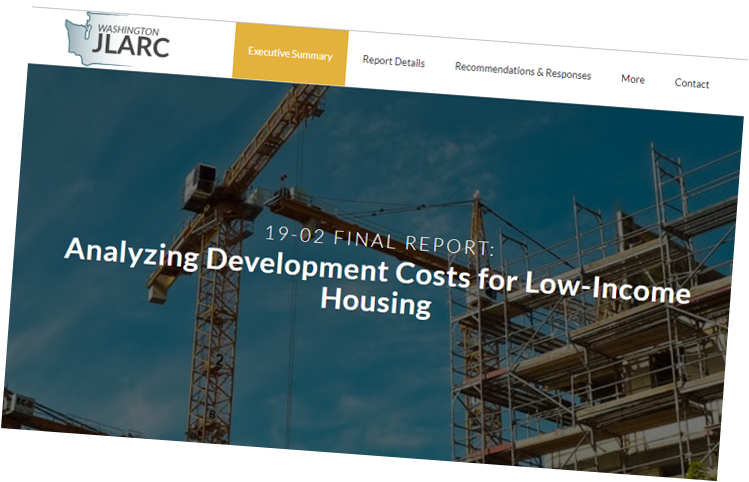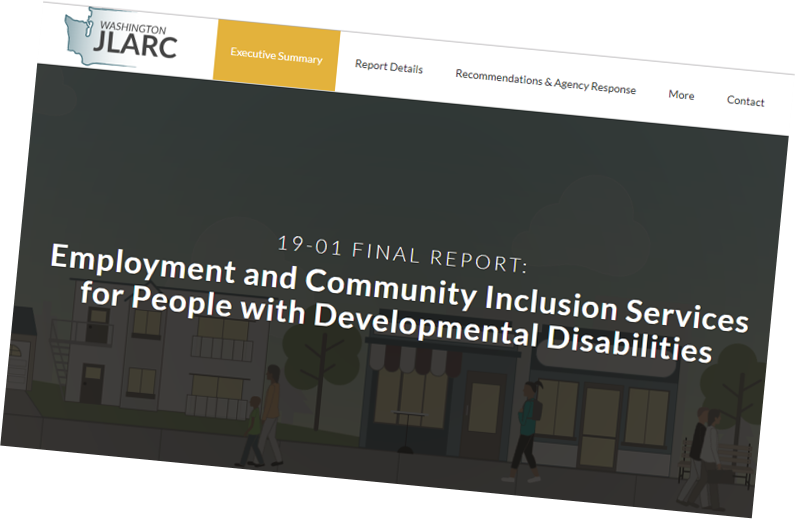In addition, the Legislature implemented the recommendation to reauthorize the
alternative contracting processes for University of Washington patient care
facilities. The process would have ended under the Sunset Act.
| Report Title |
Agency |
Recommendation |
Implementation Status |
| Competency to Stand Trial Report 14-1
|
Department of Social and Health Services |
The Behavioral Health and Service Integration Administration should provide
accurate, consistent, and timely reporting on the number of defendants referred
for competency evaluations, the number of evaluations completed, and the timelines
in admitting defendants to the hospitals. |
Action in Progress |
| Competency to Stand Trial Report 14-1 |
Department of Social and Health Services |
After collecting and analyzing descriptive data about its current operations,
the Department of Social and Health Services should hire an independent,
external consultant to develop 1) a service delivery approach that enables the
Behavioral Health and Service Integration Administration (the Administration) to
meet the statutory targets, and 2) a staffing model to implement the new
approach. |
Action in Progress |
| Competency to Stand Trial Report 14-1 |
Department of Social and Health Services |
The Behavioral Health and Service Integration Administration should take
actions to comply with additional statutory requirements from SSB 6492. |
Partially Implemented |
| Competency to Stand Trial Report 14-1 |
Department of Social and Health Services |
The Behavioral Health and Service Integration Administration, its primary
judicial system partners, including the Administrative Office of the Courts, and
other stakeholders should meet to develop an approach to assure collaboration
and communication among the partners. |
Implemented |
| Competency to Stand Trial Report 14-1 |
Department of Social and Health Services |
The Behavioral Health and Service Integration Administration should work with
its judicial system partners, including the Administrative Office of the Courts
and other stakeholders, to develop training specific to their professions, as
well as training material appropriate for cross training. |
Action in Progress |
| UW Alternative Public Works Sunset Review
Report 14-3
|
University of Washington (UW) |
UW should identify opportunities to reduce the time to select contractors for
Harborview projects. UW should report the results of its review to the
Legislature and the Capital Projects Advisory Review Board. |
Implemented |
| UW Alternative Public Works Sunset Review
Report 14-3
|
University of Washington (UW) |
UW should track use of woman- and minority-owned subcontractors on projects
using the alternative process to determine whether it is meeting its internal
goal. |
Implemented |
| UW Alternative Public Works Sunset Review
Report 14-3
|
University of Washington (UW) |
UW should review the other contracting steps that follow contractor selection
to identify opportunities to reduce the time to begin constructing Harborview
projects. UW should report the results of its review to the Legislature and the
Capital Projects Advisory Board. |
Implemented |
| Gas Vapor Regulations Report
14-4 |
Department of Ecology, Puget Sound Clean Air Agency, Southwest Clean Air
Agency |
The Department of Ecology and the local clean air agencies should estimate and
publish when Stage II requirements will begin to increase emissions. This
analysis should determine whether keeping Stage II systems helps the regions
meet Environmental Protection Agency's current ozone standard and the costs and
cost effectiveness associated with keeping these systems. |
Implemented |
| Highway Maintenance and Preservation Needs
Report 14-5
|
Department of Transportation (WSDOT) |
WSDOT should use best practices to make its bridge estimates as reliable as
its pavement estimates.
|
Action in Progress |
| Highway Maintenance and Preservation Needs Report
14-5 |
Office of Financial Management (OFM), Department of Transportation
(WSDOT) |
WSDOT and OFM should develop a process to improve stakeholders’ confidence in
its highway estimates.
|
Action in Progress |
| State Recreation and Habitat Lands Report
15-1 |
Recreation and Conservation Office, Department of Natural Resources,
Department of Fish and Wildlife, Washington State Parks and Recreation
Commission |
The Legislative Auditor recommends that the five agencies develop a single,
easily-accessible source for information about proposed recreation and habitat
land acquisitions, including detailed outcomes and future costs. |
Action in Progress |
| Workers’ Compensation Claims Management
Report 15-4
|
Department of Labor and Industries (L&I) |
L&I should institute standards for early phone contact, claim management
planning, and clear documentation in claims management. L&I should provide a
plan to JLARC for how and when it will achieve the standards and provide annual
progress reports describing actions taken to complete the plan. |
Action in Progress |
| Workers’ Compensation Claims Management
Report 15-4
|
Department of Labor and Industries (L&I) |
L&I should expand its pilot programs and enhance its claims management
support systems (training, performance measures, and technology) with a focus on
return to work. L&I should provide a plan to JLARC for how and when it will
expand pilot programs and enhance support systems and should provide annual
progress reports describing actions taken to complete the plan. |
Action in Progress |
| Unemployment Insurance Training Benefits Report 16-1 |
Employment Security Department |
The Employment Security Department should prepare a plan to identify reasons
why outcomes improve for some training benefits participants and not others, and
determine whether there are opportunities to change the Program to improve
outcomes for all participants. |
Action in Progress |
| Unemployment Insurance Training Benefits
Report 16-1
|
Employment Security Department |
The Employment Security Department should develop a plan and associated cost
estimate to improve its administration of the Training Benefits Program, to
include: improving the application form, improving guidance to its Program
partners, improving the timeliness of its decisions, establishing quality
assurance review, and improving its performance measures. |
Action in Progress |
| Second Sunset Review of UW's Alternative Process for Selecting Medical Facility
Construction Contractors Report 17-1 |
Legislature |
The Legislature should continue the UW’s alternative process for selecting
medical facility construction contractors because overall timeliness and
contractor performance ratings have improved. |
Implemented |
| Second Sunset Review of UW's Alternative Process for Selecting Medical Facility
Construction Contractors Report 17-1 |
University of Washington (UW) |
The UW should establish timeliness goals for selecting a contractor and
beginning construction, and annually monitor its progress in meeting its goals.
The UW should report this information to the Capital Projects Advisory Review
Board (CPARB) by September 2017, and in its subsequent biennial reports. |
Action in Progress |
| Second Sunset Review of UW's Alternative Process for Selecting Medical Facility
Construction Contractors Report 17-1 |
University of Washington (UW) and Office of Minority and Women's Business
Enterprises (OMWBE) |
In consultation with the Office of Minority and Women's Business Enterprises,
the UW should identify the barriers it believes impede its use of certified
minority and woman owned firms and suggest remedies to those barriers. The UW
should report this information to the Capital Projects Advisory Review Board
(CPARB) by September 2017, and in its subsequent biennial reports. CPARB can then
determine whether or not to recommend policy changes to the Legislature. |
Action in Progress |
| Unaccompanied Homeless Youth
Report 17-3 |
Department of Commerce (Commerce) and Office of Superintendent of Public
Instruction (OSPI) |
Commerce and OSPI should issue joint guidance to counties and school districts, and clarify how they can work together to improve estimates of the unaccompanied homeless youth population. |
Partially Implemented |
| Governor’s Interagency Coordinating Council on Health Disparities
Report 17-4 |
The Council |
The Council should submit action plan updates every two years with content that reflects the entire prioritized list of health disparities. |
Partially Implemented |
| Governor’s Interagency Coordinating Council on Health Disparities
Report 17-04 |
The Council |
The Council should include the status of all recommendations and all diseases, conditions, and health indicators from the prioritized list in its progress reports. |
Action in Progress |
| Puget Sound Partnership 2016
Report 17-05 |
Puget Sound Partnership and Office of Financial Management |
The Partnership should submit a plan to the Legislature that identifies and addresses needed revisions to the planning and recovery timeframes. |
Implemented |
| Puget Sound Partnership 2016
Report 17-05 |
Puget Sound Partnership (Partnership) and Office of Financial Management
(OFM) |
The OFM and the Partnership should submit a plan to the Legislature that details
how they will create a more complete inventory of recovery actions and
funding. |
Action in Progress |
| Puget Sound Partnership 2016
Report 17-05 |
Puget Sound Partnership (Partnership) and Office of Financial Management |
The Partnership should submit a plan to the Legislature that details how it will address the deficiencies in its ability to meet the essential requirements for a monitoring program, as identified by JLARC staff. The plan should also address how the Partnership will improve and clarify links between monitoring and planning. |
Partially Implemented |
| Fees Assessed for Forest Fire Protection
Report 17-06 |
Department of Natural Resources (DNR) |
DNR should clarify the definition of forest land and implement a process to consistently apply the definition across the state. |
Action in Progress |
| Fees Assessed for Forest Fire Protection
Report 17-06 |
Department of Natural Resources (DNR) |
DNR should coordinate with county officials to create consistent policies for administering the assessment
DNR should develop consistent guidance for county officials to address parcel changes that impact the assessment. DNR should solicit input from county officials to ensure that they can efficiently and effectively implement the guidance. In addition to guidance, DNR should develop a policy regarding communications with county officials. |
Action in Progress |
 The Joint
Legislative Audit and Review Committee (JLARC) is a bicameral, bipartisan committee
with a staff of professional analysts working under my direction.
The Joint
Legislative Audit and Review Committee (JLARC) is a bicameral, bipartisan committee
with a staff of professional analysts working under my direction.











 The
Legislative Auditor concluded that the state’s ability to evaluate program outcomes
for homeless youth is hindered by limits on collecting personal data. Legal advice
to state agencies indicated that unaccompanied minors could not give consent to
provide personally identifiable information. Without this information, the state was
not able to accurately monitor and evaluate the outcomes for youth it served.
The
Legislative Auditor concluded that the state’s ability to evaluate program outcomes
for homeless youth is hindered by limits on collecting personal data. Legal advice
to state agencies indicated that unaccompanied minors could not give consent to
provide personally identifiable information. Without this information, the state was
not able to accurately monitor and evaluate the outcomes for youth it served. Our audits offer recommendations to improve agencies’
performance or respond directly to questions posed by the Legislature. Between 2014
and 2017, the Joint Legislative Audit & Review Committee issued 27 recommendations
to state agencies to improve the efficiency, effectiveness, and accountability of
their operations.
Our audits offer recommendations to improve agencies’
performance or respond directly to questions posed by the Legislature. Between 2014
and 2017, the Joint Legislative Audit & Review Committee issued 27 recommendations
to state agencies to improve the efficiency, effectiveness, and accountability of
their operations. 